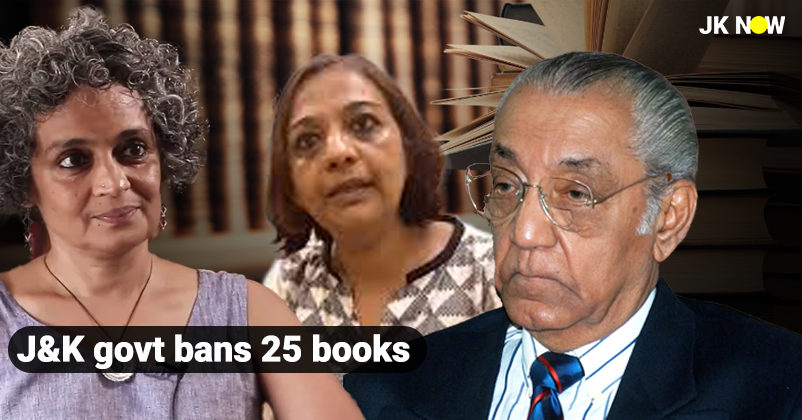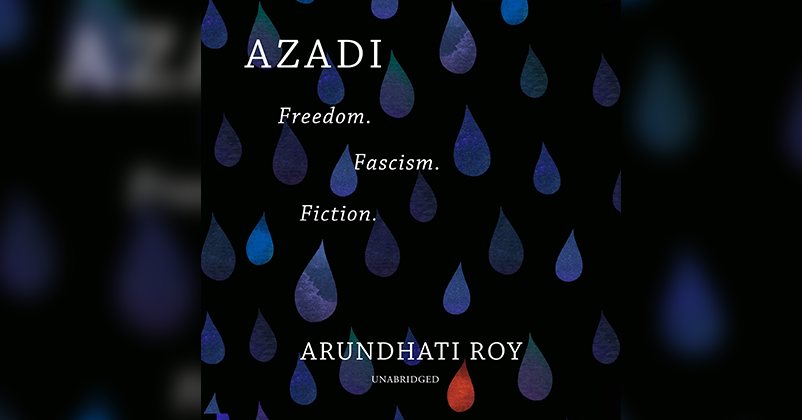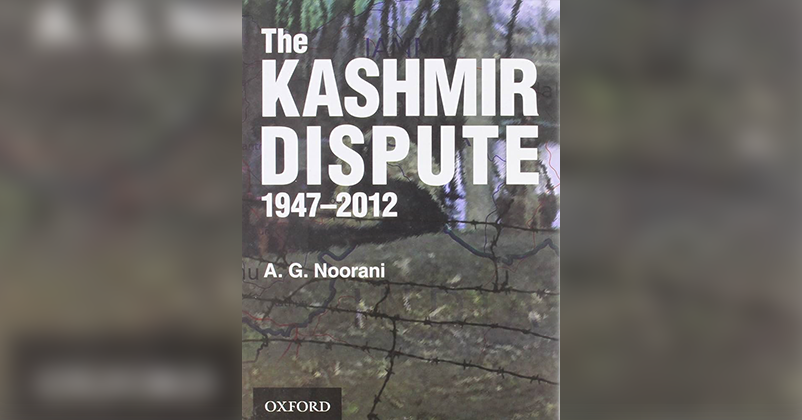J&K govt bans books by Arundhati Roy, Noorani, Schofield and others for false narratives, glorifying terrorism
Total Views |

Jammu Kashmir government has banned 25 books, including those authored by Arundhati Roy, A.G. Noorani, Victoria Schofield, and David Devadas, declaring them as forfeited for “promoting false narratives and glorifying terrorism.”
“It has come to the notice of the Government, that certain literature propagates false narrative and secessionism in the Jammu and Kashmir,” reads an order issued by the Home Department on Wednesday.
The order further states that available evidence based on investigations and credible intelligence “unflinchingly indicate” that a significant driver behind youth participation in violence and terrorism has been the “systematic dissemination of false narratives and secessionist literature by its persistent internal circulation, often disguised as historical or political commentary, while playing a critical role in misguiding the youth, glorifying terrorism and inciting violence against Indian State. This literature would deeply impact the psyche of youth by promoting culture of grievance, victim hood and terrorist heroism. Some of the means by which this literature has contributed to the radicalization of youth in J&K include distortion of historical facts, glorification of terrorists, vilification of security forces, religious radicalization, promotion of alienation, pathway to violence and terrorism etc”.
The government took action under Section 98 of the Bhartiya Nagarik Suraksha Sanhita, 2023. It also said that the content of these books violates Sections 152, 196, and 197 of the Bhartiya Nyaya Sanhita, 2023, which are laws meant to protect India’s unity, integrity, and sovereignty.
Following are the books that have been forfeited:
Human Rights Violations in Kashmir by Piotr Balcerowicz and Agnieszka Kuszewska, Kashmir's Fight for Freedom by Mohd Yosuf Saraf, Colonizing Kashmir: State-Building under Indian Occupation by Hafsa Kanjwal, Kashmir Politics and Plebiscite by Dr. Abdul Jabbar Gockhami, Do You Remember Kunan Poshpora? by Essar Batool and others, Mujahid ki Azaan by Imam Hasan Al-Bana Shaheed, edited by Maulana Mohammad Enayatullah Subhani, Al Jihadul fil Islam by Moulana Abul A'la Maududi, Independent Kashmir by Christopher Snedden, Resisting Occupation in Kashmir by Haley Duschinski, Mona Bhat, Ather Zia, and Cynthia Mahmood, Between Democracy and Nation: Gender and Militarization in Kashmir by Seema Kazi, Contested Lands by Sumantra Bose, In Search of a Future: The Story of Kashmir by David Devadas, Kashmir in Conflict: India, Pakistan and the Unending War by Victoria Schofield, The Kashmir Dispute 1947-2012 by A.G. Noorani, Kashmir at the Crossroads: Inside a 21st Century Conflict by Sumantra Bose, A Dismantled State: The Untold Story of Kashmir after Article 370 by Anuradha Bhasin, Resisting Disappearance: Military Occupation and Women's Activism in Kashmir by Ather Zia, Confronting Terrorism edited by Maroof Raza (with contributions by Stephen P. Cohen noted in some sources), Freedom in Captivity: Negotiations of Belonging Along Kashmiri Frontier by Radhika Gupta, Kashmir: The Case for Freedom by Tariq Ali, Hilal Bhatt, Angana P. Chatterji, Pankaj Mishra, and Arundhati Roy, Azadi by Arundhati Roy, USA and Kashmir by Dr. Shamshad Shan, Law and Conflict Resolution in Kashmir by Piotr Balcerowiez and Agnieszka Kuszewska, Tarikh-i-Siyasat Kashmir by Dr. Afaq, and Kashmir and the Future of South Asia by Sugata Bose and Ayesha Jalal.
Although all these books promote a false narrative or glorify terrorism in Kashmir, contributing to the radicalisation of youth, we will mention only a few of them here.

Arundhati Roy’s “Azadi: Freedom. Fascism. Fiction.”
Indian author Arundhati Roy’s book “Azadi: Freedom. Fascism. Fiction”, clearly promotes a false and one sided narrative that fuels secessionist thinking and glorifies terrorism in Kashmir. She portrays Kashmiris solely as victims, ignores the complex realities on the ground, and in doing so, she feeds into a dangerous, oversimplified story that spark separatist emotions.
Her writing often shows terrorist groups in a sympathetic light, framing them as freedom fighters (a term used by Pakistan for terrorists in Kashmir). This kind of messaging normalises violent methods as if they’re justified ways to push political agendas. It damages national unity and strengthens separatist ideologies that threaten India’s integrity.
By directly questioning India’s sovereignty over Kashmir and portraying the Indian government as oppressive, Roy’s views end up dividing rather than uniting. She gives more space to separatist voices which raises serious questions about the intent and impact of her work , especially when national identity and stability are at stake.

Victoria Schofield’s “Kashmir in Conflict”
British Author Rosemary Victoria Schofield’s book “Kashmir in Conflict” has faced strong criticism for pushing an anti-India narrative by presenting the Kashmir issue mostly from a separatist point of view. The book repeatedly questions India’s rightful claim over Jammu and Kashmir, while quietly echoing Pakistani and separatist perspectives. It downplays the serious threat of terrorism and Pakistan sponsored cross border infiltration.
Schofield puts a heavy focus on alleged human rights abuses by Indian forces, while selectively picking historical events that suit a particular narrative. This creates a picture where separatist voices are shown only as victims, feeding into a story of resistance that indirectly encourages secessionist thought. Her version of the story ignores how democracy has worked in the region, the sacrifices made by Indian soldiers, and the fact that Kashmiris support India. By showing only one side, the book spreads a message that divides people instead of bringing out the truth or helping peace.

A.G. Noorani’s “The Kashmir Dispute”
A.G. Noorani’s book “The Kashmir Dispute” is often criticized for promoting an anti-India viewpoint and encouraging separatist thinking. In the book, Noorani highlights the complaints of the Kashmiri people and strongly criticizes the Indian government’s actions in the region.
The book presents Kashmir primarily as a case of historical and political injustice by India, highlighting the grievances of separatist voices while heavily criticizing Indian policies.
By mostly showing separatist voices as victims of injustice, the book supports the idea of independence and self-rule. This kind of narrative can be seen as harmful to India’s unity and sovereignty because it gives more attention to voices that want separation rather than peace and understanding.

